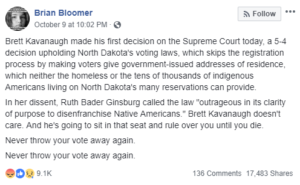I’ve got a new piece at Ricochet on the problems with the Indian Child Welfare Act of 1978, which a federal judge struck down as unconstitutional in October in a ruling (Brackeen v. Zinke) likely to be appealed. Excerpt:
One effect is to give tribal governments dangerous power over persons who never willingly submitted to their authority, including persons who have never set foot in Indian country. A couple briefly connect at a bar in Boston or Brooklyn or Baltimore one night and a child is born as a result. The father may not have mentioned at the time, indeed may only imperfectly remember, that as a child he was inducted into an affiliation with some faraway tribe toward whose leadership he has long felt indifferent or estranged. But ICWA covers as an “Indian child” any biological child of a tribal member so long as that child is “eligible for membership” in a tribe.
Sorry, Dad – and sorry, total-bystander Brooklyn Mom — but under ICWA that distant tribe now has a lot of power over your future. You are not necessarily free to make an adoption plan with some trusted member of your local community. Instead, you must submit to a distant tribal authority and prepare for the child’s possible “placement … in … homes [that] reflect the unique values of Indian culture.” What about your own cultural background as a non-Native parent, along with that of your relatives who may have been helping care for the child during his first years? Your youngster may have spent his life thus far immersed in that other culture — perhaps Korean-American, or Dominican, or African-American, or Eastern European. But the law cares not. In fact, it encourages as “ICWA-compliant” placement of your child with any Indian tribe around the country, however remote from that of either biological parent’s, in preference to any non-Native placement, however well matched to the circumstances of the child’s life thus far.
More discussion of the Brackeen case and ICWA: Wade Goodwyn, NPR. My piece stirred discussion at Ricochet including this from commenter Skyler:
The law I really despise is the ICPC, the Interstate Compact for the Protection of Children. It was originally intended to stop states from dumping foster children in other states to take advantage of their looser welfare policies.
First, it would seem to me that this should be the price paid for having loose welfare policies, but beyond that the real effect of the law is horrendous.
What the act does is make it hard to move children to caregivers out of state without that state’s permission or agreement. That agreement can take many months. A court action to return children to parents or name the state as their conservator has to be completed within a deadline, usually one year.
So, I have several cases where the parents’ families are from out of state. They have a large family network in that other state. But we can’t move the children to that family and have to put them in foster care. By the time the ICPC is completed, the foster family has a vested interest in the children and now they are fighting, and often succeed, in keeping the children away from the blood family.
I find this result to be repulsive, and that result is not at all unusual. I have a case that just ended where the mom and the dad’s family in New Hampshire are both very fine with middle class homes and lots of family support, yet because the children had been kept in foster care the courts don’t want to “disrupt” their lives again. It’s just about the most asinine government policy ever.
This gets me curious about ICPC. Other comments about its history and workings, positive or otherwise, are welcome.

